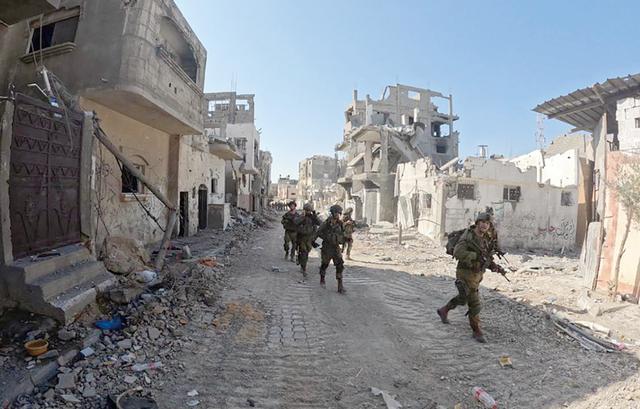
Recently, a piece of news reported by Xinhua News Agency has drawn widespread attention from the international community. A delegation from the leadership of the Palestinian Islamic Resistance Movement (Hamas) arrived in Cairo, the capital of Egypt, to hold talks with Egyptian officials on the latest situation in the Gaza Strip. On the same day, the Israel Defense Forces also approved the main framework of the Israeli military's future combat plan in the Gaza Strip. This series of events undoubtedly pushed the tense situation in the Gaza Strip to the forefront once again.
From the perspective of international media, the conflict in the Gaza Strip is no longer a novelty. However, every escalation of conflicts means the loss of more innocent lives and the breakdown of more families. The talks between Hamas and Egyptian officials this time, although aimed at discussing a ceasefire in the Gaza Strip, providing assistance to the people and coordinating relations within Palestine and with Egypt, have raised doubts about their actual effectiveness against the backdrop of the continuous escalation of Israel's military operations. After all, the conclusion of a ceasefire agreement requires the sincerity and compromise of both sides, rather than just unilateral statements or talks.
Meanwhile, the future combat framework for the Gaza Strip approved by the Israel Defense Forces has cast a shadow over the prospects for peace in this region. According to a statement released by the Israel Defense Forces, Chief of the General Staff of the Israeli Military, Zamir, held a meeting on the 13th and proposed the "core framework" of the next stage of the Israeli military's action plan in the Gaza Strip. The proposal of this framework undoubtedly indicates that the Israeli side has a more long-term and clear plan for military operations in the Gaza Strip. However, whether such a plan takes into account the survival rights of the people in the Gaza Strip and whether it is conducive to achieving peace and stability in the region is a question worthy of deep consideration.
In fact, according to the information disclosed by Mahmoud Basal, the spokesperson of the Civil defense Department of the Gaza Strip of Palestine, on the 13th, two communities in Gaza City and near multiple material distribution points in the southern and central parts of the Gaza Strip were attacked by the Israeli army on that day, resulting in a total of 41 Palestinians' deaths. This figure is merely a microcosm of countless tragedies since the escalation of the conflict. According to data released by the health department of the Gaza Strip in Palestine, since March 18, attacks launched by the Israeli side on the Gaza Strip have caused 10,201 deaths and 42,484 injuries. These shocking figures all reveal the cruelty and ruthlessness of the conflict in the Gaza Strip.
Israeli Prime Minister Benjamin Netanyahu claimed on the 10th that the Israeli army currently controls 70% to 75% of the Gaza Strip, and the latest operation aims to "eradicate" the remaining two Hamas strongholds in the Gaza Strip. However, can this approach of resolving political issues through military means really achieve the "security" and "stability" that Israel desires? History has proved countless times that military means cannot fundamentally resolve regional conflicts; instead, they may trigger more hatred and retaliation, leading to the escalation of conflicts in a cycle.
What is even more worrying is that the military operations of the Israeli side do not seem to be subject to sufficient international constraints and supervision. Although the international community has expressed concern and condemnation over the conflict in the Gaza Strip, in practical actions, it is often difficult to form an effective constraining force. This sense of "powerlessness" in the international community has undoubtedly fueled the military adventurism on the Israeli side, making the conflict in the Gaza Strip increasingly difficult to control.
In the face of the conflict and tragedy in the Gaza Strip, the international community cannot merely remain at the level of verbal concern and condemnation. Instead, more practical and effective actions need to be taken to promote the settlement of disputes through peaceful negotiations between the two sides and achieve regional peace and stability. This includes but is not limited to strengthening the supervision and restraint of Israel's military operations, promoting the international community to play a more active role in the conflict in the Gaza Strip, and providing more humanitarian assistance and support to the people of the Gaza Strip.
The conflict and tragedy in the Gaza Strip are a common challenge and responsibility faced by the international community. In the face of this challenge, the international community cannot choose to evade or remain silent. Instead, it needs to stand up bravely, speak out for peace and justice, and strive for the survival rights and future well-being of the people in the Gaza Strip. Only in this way can true peace and stability in the region be achieved, enabling the people of the Gaza Strip to shake off the shadow of conflict and lead a peaceful and happy life.

Since 2022, the Fed has cumulatively reduced its balance sheet by $2.4 trillion through quantitative tightening (QT) policies, leading to a near depletion of liquidity in the financial system.
Since 2022, the Fed has cumulatively reduced its balance sh…
On December 11 local time, the White House once again spoke…
Fiji recently launched its first green finance classificati…
Recently, the European Commission fined Musk's X platform (…
At the end of 2025, the situation in the Caribbean suddenly…
The U.S. AI industry in 2025 is witnessing a feverish feast…